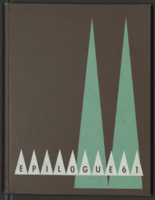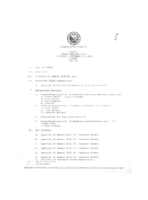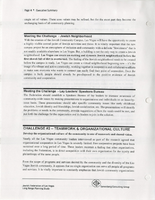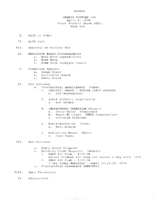Search the Special Collections and Archives Portal
Search Results

Bobbie and Cody Lin Jones oral history interview: transcript
Date
Archival Collection
Description
Oral history interview with Bobbie and Cody Lin Jones conducted by Claytee D. White on December 9, 2017 for the Remembering 1 October Oral History Project. In this interview, Bobbie and Cody Lin Jones, mother and daughter, discuss their love for country music and their experience going to the Route 91 Harvest music festival in 2017. Bobbie describes how her military training helped her and her daughter survive the shooting of that weekend, and both discuss what they had seen during the shooting. Bobbie and Cody Lin talk about adjusting to life after the event and the little things that have changed in their day-to-day living.
Text

Leslie Mujica oral history interview: transcript
Date
Archival Collection
Description
Oral history interview with Leslie Mujica conducted by Barbrara Tabach on June 2, 2020 for the Latinx Voices of Southern Nevada Oral History Project and The Great Pause: Las Vegas Chronicles of the Covid-19 Pandemic. In this interview, Mujica talks about her childhood growing up in Guatemala and immigrating to Southern California with her family in 1980. She discusses her move to Las Vegas in 2005 and her employment history both in nonprofit work and in construction, which led to the pursuit of her current position as the Executive Director and Chief Marketing Officer of Las Vegas Power Professionals. Leslie also shares her educational history with the University of Nevada, Las Vegas. It is where she obtained her Master's Degree in Public Administration and where Leslie currently serves as a board member of the Latinx Voices Project and the Alumni Legacy Board.
Text

Hernando Amaya oral history interview: transcript
Date
Archival Collection
Description
Oral history interview with Hernando Amaya conducted by Laurents Banuelos-Benitez, Marcela Rodriguez-Campo, and Barbara Tabach on October 18, 2018 and December 3, 2018 for the Latinx Voices of Southern Nevada Oral History Project. In this interview, Hernando Amaya talks about his childhood and education in Bogota, Colombia. He discusses his start in journalism as a young man and working for El Espectador, the Colombian national newspaper. He discusses his experiences reporting on the narco-terrorism occurring in Medellin, Colombia and how this eventually led to his immigration to the United States. Amaya moved to Las Vegas, Nevada in 2001 and continued his career in journalism by working for local Spanish speaking papers and websites. He relates his civic involvement in the Las Vegas area, his work as the president of the Colombian Association of Las Vegas, and various other civic engagements. As a journalist, he asserts the importance of knowing one's culture, storytelling, learning history, and being active in the community.
Text

Epilogue: Nevada Southern University Yearbook, 1961
Date
Description
Yearbook main highlights: schools and departments; detailed lists with names and headshots of faculty, administration and students; variety of photos from activities, festivals, campus life, and buildings; campus organizations such as sororities, fraternities and councils; beauty contest winners; college sports and featured athletes; and printed advertisements of local businesses; Institution name: Nevada Southern University, Las Vegas, NV
Mixed Content

Transcript of interview with Peggy Huber by Greg Pushard, March 14, 1981
Date
Archival Collection
Description
On March 14th, 1981, collector Greg Pushard interviewed postmaster Peggy Huber (born March 31st, 1884 in Conway, Arkansas) in her home in Las Vegas, Nevada. This interview covers Peggy’s life in Nevada and also offers an insightful overview of Nevada’s rich history. During this interview Peggy discusses life on the ranch, mining, settlement, and the local early aboveground atomic blasts.
Text

Transcript of interview with Laura & Don Garvin by Michael Martocci, March 3, 1979
Date
Archival Collection
Description
On March 3, 1979, Michael Martocci interviewed Laura (born in California) and Don Garvin (born in Goldfield, Nevada) about their lives in Las Vegas, Nevada. The two provide details on their family background, the first sources of water in Las Vegas, and the early city limits. They also describe their early occupations, religion, gambling, the Mormon Fort, and the effects of the Great Depression. The interview concludes with a brief discussion on the development of the Las Vegas Strip and recreational activities.
Text

Meeting minutes for Consolidated Student Senate University of Nevada, Las Vegas, November 12, 1987
Date
Archival Collection
Description
Text

Meeting minutes for Consolidated Student Senate, University of Nevada, Las Vegas, February 28, 2000
Date
Archival Collection
Description
Text

Jewish Federation of Las Vegas long-range planning study, 2000
Date
Archival Collection
Description
Long-range planning study conducted and prepared by the Levenberg Consulting Group regarding the Jewish community of Las Vegas with particular attention to Jewish elderly, the economically disadvantaged, young adults, and Jewish education at all ages.
Text

Meeting minutes for Consolidated Student Senate, University of Nevada, Las Vegas, April 4, 1978
Date
Archival Collection
Description
Text
